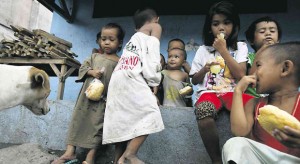MANILA, Philippines–Over 500,000 public school students who show signs of severe acute malnutrition will be included in a feeding program of the Department of Education (DepEd) and the Department of Social Welfare and Development (DSWD) starting next month.
In an Aug. 18 memorandum, DepEd Secretary Armin Luistro ordered the implementation of the school-based feeding program (SBFP) to address undernutrition and short-term hunger among public school children nationwide. Over P1 billion has been allocated for the program.
“For this school year (2014-15), the program will prioritize 562,262 or 100 percent of the Kindergarten to Grade 6 pupils categorized under severely wasted in all schools based on the nutritional status report as of SY 2011-12,” Luistro said.
Should there be excess funds, the SBFP would also cover public school pupils showing early symptoms of mild malnutrition, he said.
Luistro said the 120-day SBFP is expected to teach the children nutritional values and behavior and to improve their health, resulting in 85- to 100-percent classroom attendance.
According to the United Kingdom-based International Action against Hunger, severe wasting manifests severe acute malnutrition characterized by massive loss of body fat and muscle tissue. Severely wasted children, the humanitarian organization said, “look almost elderly and their bodies are extremely thin and skeletal.”
Also tapped to be partners in the undertaking are local government units and nongovernment organizations.
Most of the beneficiaries targeted by the SBFP are in the Calabarzon region, covering the provinces of Cavite, Laguna, Batangas, Rizal and Quezon, where P209.7 million has been allocated for 109,237 school children. In Metro Manila, P112.6 million has been set aside for 58,673 student beneficiaries.
The budget allocation for the feeding activity is P15 per beneficiary multiplied by 120 feeding days.
The SBFP aims to give children hot meals based on malunggay recipes and 20-day cycle menus using locally produced or grown food, assuring beneficiaries of 300 additional calories to address their nutritional deficiencies.
According to SBFP operational guidelines, a variety of vegetables grown in the schools’ gardens may be served in order to avoid commodity fatigue, which children are prone to. Priority is given to Kindergarten to Grade 3 pupils.
RELATED STORY
